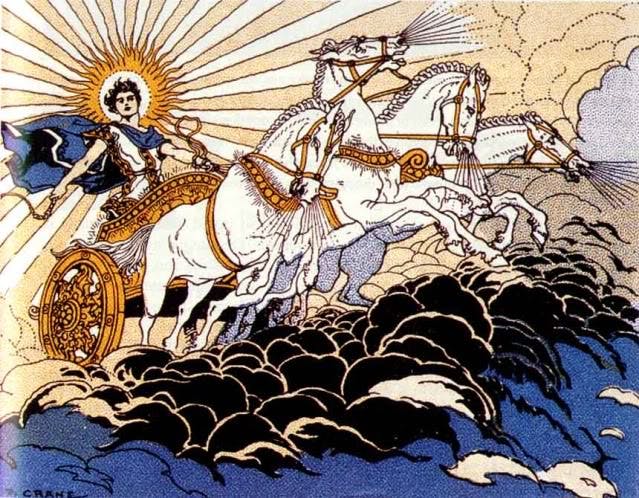Mythological Names: Ancient Greek vs Ancient Roman–take your pick!
In the mythologies of ancient Greece and Rome, most of the deities had shared lineages, dominions and attributes—but not appellations. I thought it might be fun to pit the mythological names of the two cultures against each other and let you see if your taste ran more to the Greek or Roman. The one major exception to this rule is Apollo—recently chosen by Gwen Stefani and Gavin Rossdale—whose name stayed the same.
Here they are, with Greek mythology names on the left, the Roman mythology names to the right.
Aphrodite vs Venus—The goddess of love and beauty, associated with the myrtle tree, doves, sparrows and swans, she was said to have been born fully-grown from the sea-foam. She was also considered the mother of the Roman people and is the namesake of a heavenly planet. Venus’s name was brought down to earth by tennis champ Venus Williams; it was in the Top 100 from 1945 to 1975, but has been off the list since 1982.
Ares vs Mars—The god of war’s name projects a somewhat fierce image, which, in the case of Mars, became a bit less intimidating when Erykah Badu gave it to her daughter. Another major planetary name, it could make an interesting unisex middle.
Artemis vs Diana—The virgin goddess of the hunt is connected with the moon, the healing arts, childbirth, and as a protector of young girls and wild animals. Heard recently on the large and small screens, Artemis is beginning to attract baby-namers’ attention. Diana, on the other hand, is a well-used classic, a constant on the Social Security list, in the Top 50 from 1945 to 1959, and again (thank you, Princess Di), from 1981-1998. She currently ranks at Number 251.
Athena vs Minerva—The warrior goddess of wisdom and patron of handicrafts, mathematics and invention, this daughter of Zeus sprang fully-grown from her father’s head. Steadily on the list since 1955, Athena came into the spotlight recently as the middle name Tina Fey chose for her daughter, and was also the name of Ariel’s mom in The Little Mermaid. Minerva was a vintage fave, on the list for almost a century, from 1880 to 1970, making a return appearance in Harry Potter. Newfound love for adorable nickname Minnie could bring it back.
Demeter vs Ceres—The goddess of the harvest, of agriculture, growth and nourishment. Variant Demetria is the full name of actress Demi Moore, and Demeter would be another path to that attractive nickname.
Eos vs Aurora—Not much of a contest here between the two names of the goddess of dawn. Aurora is a soft and romantic (Disney) princess name that’s experiencing a burst of popularity—she’s Number 166 on the national list and way up at Number 17 among Nameberries
Eros vs Cupid—The name of the god of love, in both its forms, is too powerful to have many baby namesakes.
Gaia vs Terra—Two names for Mother Earth. Gaia, pronounced GUY-a, was used by Emma Thompson for her daughter (she said she was attracted by its ecological element), and is the protagonist of the Fearless novels, while Terra had a surprisingly active record on the popularity lists from 1970 to 1996, reaching Number 379 in 1980.
Helios vs Sol—The god of the sun–though we’re sure most of the Sols who brought their name into the Top 500 in the early decades of the 20th century, at a high of Number 257 in 1913, had more to do with a shortening of Solomon than with the Roman god.
Hera vs Juno—The Greek vs. the Roman names for the Queen of the Heavens, the patron goddess of Rome and protector of women and marriage. Juno, though it hasn’t yet appeared on the Social Security list, is hot enough to be ready to register before long; it was used by Will Champion for his daughter.
Hermes vs Mercury—The messenger of the gods, moving between the worlds of the mortal and the divine, and also the god of physicians, poets, travelers and thieves. Hermes, pronounced the French way, with an accent over the second ‘e’, is associated with the venerable French luxe firm known for its perfume, jewelry and leather goods; actress Kelly Rutherford chose it for her son.
Hestia vs Vesta—These two similar forms of the name for the peace-loving goddess of the hearth, symbol of the home, are not likely to find many takers.
Nike vs Victoria—Whereas both these names represent the goddess of victory, for the Greeks it symbolized victory in athletic games, while for the Romans it was victory over death. Nike is too tied to the sneaks to find much use, while Victoria is a regal, long-running favorite, still at Number 28.
Persephone vs Proserpine—With a complex mythological story, the goddess of, among other things, spring growth. We’ve had the Greek version on our list of extreme names in the next style wave; the Roman one not so much.
Poseidon vs Neptune—The god of the sea, droughts and earthquakes would, in both versions, be a mighty burden for a child to bear.
Zeus vs Jupiter—The lord of the sky and supreme ruler of the Olympian gods would make an interesting, if challenging, choice in either incarnation. The planetary Jupiter could follow partner Juno into the mainstream; Zeus—the name of a 1990s soap opera character—could make a powerful middle.


